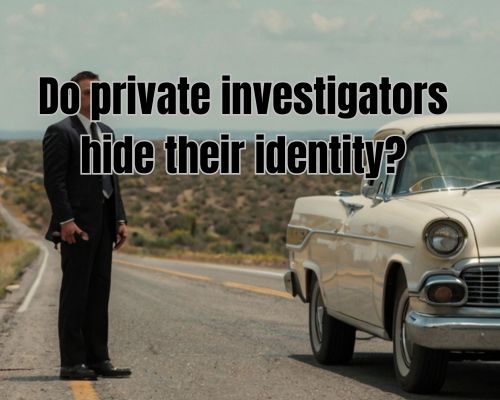
Do Private Investigators Hide Their Identity?
Exploring the Practices of Private Investigators
Private investigators are often hired by individuals, corporations, and attorneys to gather information about people, businesses, groups, or locations.
One of the most common questions people have about private investigators is whether they hide their identity during an investigation. The answer is that it depends on the situation and the laws in the state where the investigation is taking place. Let us know about this with Charles Jimerson of Private Investigator West Palm.

In some cases, private investigators may need to hide their identity to obtain information that would not be available if their true identity were known.
For example, if a private investigator is conducting surveillance on a subject, it may be necessary for them to remain hidden to avoid detection.
However, it is important to note that private investigators must follow strict rules and regulations to avoid breaking local or state laws and causing undue harm to the subjects that are under investigation.
Legalities and Licensing of Private Investigators
Private investigators play a crucial role in gathering information for individuals, attorneys, and corporations. However, they must operate within the boundaries of the law to avoid legal repercussions and ethical dilemmas.
This section will provide an overview of the legalities and licensing requirements for private investigators.
Understanding Licensing Requirements
In most states, private investigators are required to obtain a professional license to operate legally.
The licensing requirements vary from state to state, but generally, they involve a background check, completion of a training program, and passing a written exam.
Licensed private investigators like Private Investigator West Palm, have the authority to conduct investigations and gather information legally. If you are considering hiring a private investigator, it is important to verify that they are licensed in your state.
Privacy Laws and Surveillance Regulations
Privacy laws and surveillance regulations are critical considerations for private investigators. They must operate within the boundaries of the law to avoid infringing on privacy rights and avoid legal repercussions.
In most states, it is illegal to record conversations without the consent of all parties involved. GPS tracking is also subject to regulation, and private investigators must obtain the consent of the individual being tracked.
Boundaries in Investigations
Private investigators must adhere to strict guidelines to avoid breaking the law or causing undue harm to the subjects of their investigations.
They cannot trespass on private property or enter someone’s home without permission, regardless of the circumstances.
Surveillance activities typically occur in public spaces, and investigators must balance the pursuit of information with the mandate of legality and ethics.
Operational Tactics of Private Investigators
As a private investigator, your main goal is to gather information and evidence for your client. To achieve this, you need to use a variety of operational tactics that are both legal and ethical.
Here are some of the most common tactics used by private investigators:
Surveillance and Information Gathering
One of the most important tactics used by private investigators is surveillance.
This involves tracking and following a subject to gather information about their activities and movements.
Private investigators use a variety of tools and techniques to conduct surveillance, including GPS trackers, hidden cameras, and binoculars.
In addition to surveillance, private investigators also gather information through other means, such as social media and public records.
They may also conduct background checks on individuals to gather more information about their past.
Undercover Operations and Identity Protection
Private investigators may also use undercover operations to gather information.
This involves pretending to be someone else to gain access to information that would not be available otherwise.
Undercover operations can be risky, so private investigators must take precautions to protect their identity.
To protect their identity, private investigators may use a variety of tactics, such as using a false name and identity, wearing a disguise, or using a pretext to gain access to information.
Technology and Tools Used in Investigations
Technology plays a big role in modern private investigations. Private investigators use a variety of tools and techniques to gather information and evidence.
Some of these tools include GPS tracking devices, security tools, and devices for recording conversations.
In addition to technology, private investigators also use traditional investigative techniques. These include interviewing witnesses and gathering physical evidence.
Overall, private investigators use a variety of tactics to gather information and evidence for their clients. Whether it’s through surveillance, undercover operations, or technology, private investigators must always operate within the bounds of the law and ethical guidelines.
By doing so, they can provide valuable services to attorneys, businesses, and individuals who need help gathering information and evidence.